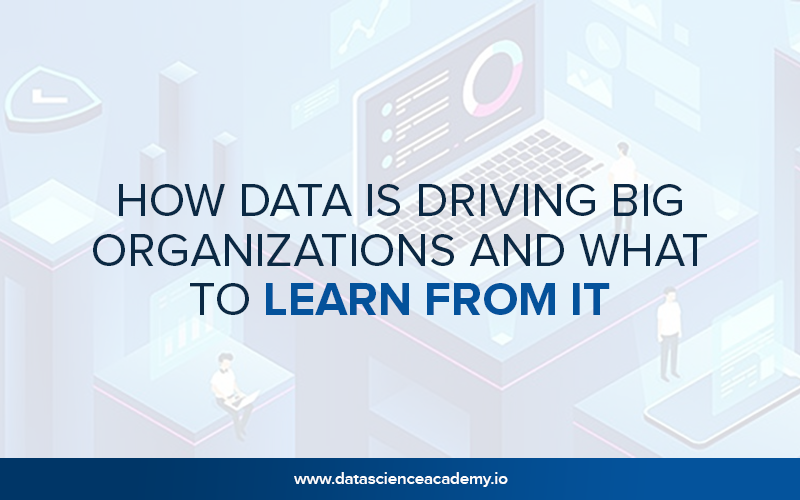
How Data Is Driving Big Organizations and What to Learn From It
Well-managed and reliable data leads to reliable analyzes and reliable decisions. To stay competitive, companies need to take full advantage of big data and act on data - making big data decisions, not intuition. The benefits of using data-based are obvious. Data organizations operate better, more predictably, and more efficiently. It is collected quickly and in large quantities to identify trends and patterns that drive customers, industry, and life itself.
In a matter of fact, it has become so simple that there is a risk that there is too much data to process. However, the average small company has less of its data than large players, though it doesn’t indicate that big data is excluded. In a matter of fact, big data is much more convenient for businesses because they are usually smarter and can respond more quickly to data-driven knowledge.
Data Helps in Improving the Procedure
All companies experience the effects of surplus. It wastes resources, wastes time, and ultimately influences. However, you can use data that shows how different marketing channels work to see which ones offer the best return on investment and focus on them. Or you can explore the reasons why other channels don’t work so well and work on improving their performance.
However, losing all existing data can be easy if you do not have the right tools to calculate it. Today, if you do not use the data to discover data that will lead to the future of your business, you will have an old-era job. Fortunately, advances in computing and visuals make it easier than ever to expand your data business. And there are tools for that too.
The Data Helps You Understand Performance
Simply put, the data helps you see the results. Today, there is no professional team without a team of databases and analysts who obtained data science certifications to help support and improve the game on the field. They are constantly updating information about who does what and how it helps the team stand out in general. Or what if you earn more than you spend?
For instance, suppose you have a sales representative who works best for you and sends the most sales leads. Looking at the data shows that it closes the purchase at a lower rate than any other sales representative who receives fewer potential buyers but offers a higher percentage of offers. Some performance data can certainly affect potential customer distribution, which can lead to higher revenue.
Data Will Help You Make Better Decisions
As per the response in the survey made clear, small businesses also produce data. In short, data helps managers make smarter decisions about their work. Every company that has a website is present on social networks and receives some form of electronic payment, collects customer data, user habits, web traffic, demographic data, and more.
All this information is full of possibilities when you know how to apply it. While this will greatly affect your decision - what’s going on in your company, there’s nothing more compelling than if you have strong data to support you. Companies can use the data to make the following decisions:
- Seeing new customers
- Increased customer loyalty
- Recognized customer service
- Better marketing management
- Follow communication on social networks
- Anticipate sales development
How Data is Driving Business – Best Practices
Marketing Methods
While human creativity and judgment are important for developing successful marketing and advertising, it is also true that numbers never lie. Big data allows companies to create marketing campaigns based on personal data of the audience, interests, location, digital communication, financial transactions, etc. This information can be completely objective, but it can also make advertising relevant to consumers.
Personal User Experience
In addition to marketing, a wealth of information can provide you with personalized advice and experiences to existing customers or subscribers. In this case, it not only helps to gain new customers but also provides existing customers with a better experience.
Develop and Improve New Products
Big data can also contribute to product innovation. The analysis is used at every step of the product market. The fast nature of data collection allows companies to make quick decisions and reduces the risk of failed projects. There are no more “blow in the dark” scenarios - there are only measurable results.
Risk Controlling
All the same, it can help identify anomalies and variations that may indicate fraud or security risks. Another risk management technique is corporate finance analysis. Greater developments may reveal signs of abuse or “gaps”. This ensures strict financial protection. For production and natural resources, big data is a rather untapped resource. The potential of this tangible industry seems to be growing.
Access, Manage and Store Big Data
Modern computer systems offer speed, power, and flexibility for quick access to large amounts and large types of data. In addition to a reliable approach, organizations also need methods for data integration, data quality assurance, data management, and data analysis for preparation and planning. Some data can be stored on-site in standard storage space, but there are also flexible and inexpensive options for storing and managing large amounts of data via cloud solutions, databases, and Hadoop.
Analyze Big Data
Keeping in mind high-performance technologies, such as network-based accounting or analytics, companies can choose to use all of their big data for analysis. Another method is to determine in advance which data are relevant before analyzing them. In both cases, big data analysis allows companies to gain value and insight into data. Big data today requires more and more diagnostic efforts, such as artificial intelligence.
Wrap-up
To summarize, Big data is a term that describes a large amount of data - organized and unorganized - that passes through a company daily. But that’s not the quantity of data that matters. This is done by organizations with relevant data. Big data can be used to analyze knowledge that leads to better strategic business decisions and trends.
